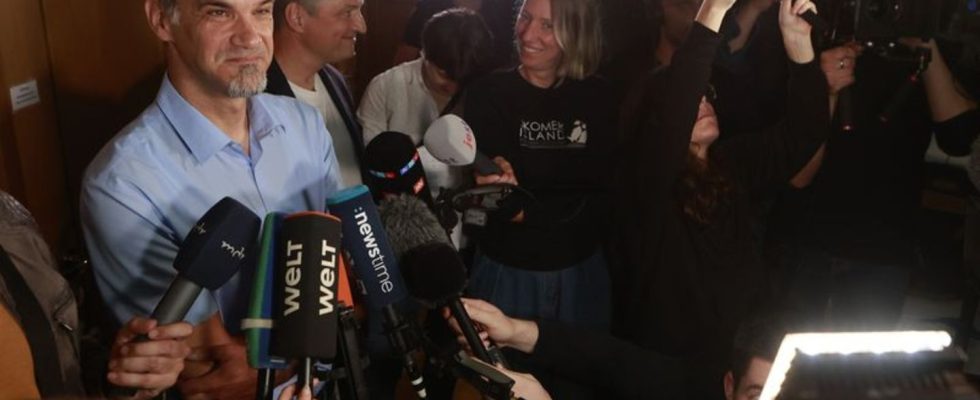Thuringia
AfD fails in mayoral election in Nordhausen
Election winner Kai Buchmann (independent) appears in front of the cameras after the votes have been counted. photo
© Matthias Bein/dpa
After a head-to-head race, the non-party incumbent holds his own in Nordhausen. The AfD had already invited people to the election party – and suffered defeat. Others react with relief.
First Sonneberg, then Nordhausen – the bill is for them AfD did not take off in Thuringia. After the district office in Sonneberg, the party was unable to win the mayoral office in Nordhausen, which was believed to be secure. Their hopes for a second top municipal office were dashed in the northern Thuringian industrial and university town. The day before the runoff election, many people and organizations held a festival there to support a city without an AfD politician at the top of the town hall.
When the trend of the runoff election became clear, dozens of people gathered in front of the council chamber that evening and cheered. Initial reactions from other parties and from the Mittelbau-Dora concentration camp memorial, which is located on the outskirts of Nordhausen, expressed relief. In Thuringia, the AfD and its leader Björn Höcke are classified and monitored by the Office for the Protection of the Constitution as proven right-wing extremists.
How the election turned out
After a long neck-and-neck race, the provisional results showed that the independent incumbent Kai Buchmann prevailed in the final runoff election. He received 54.9 percent of the vote. AfD candidate Jörg Prophet, a 61-year-old, got 45.1 percent. He went into the decision with a significantly better starting position. Prophet received 42.1 percent of the vote in the first round on September 10th, Buchmann only 23.7 percent. When the result of the runoff election was announced, long-lasting cheers broke out in the council chamber. Buchmann walked around and offered his hands to cheering supporters and hugged fellow supporters. The voter turnout was 59.3 percent.
What the opponents say
AfD man Prophet admitted his defeat even before the result was announced. “We have a new mayor. The Prophet became number two in this election,” said the entrepreneur. Buchmann said he was “very happy” about the result. He wants to spend the next six years trying to “get the best out of the city.” He has observed a large mobilization in the city in the past two weeks.
Reactions to the election results
The management of the Mittelbau-Dora Concentration Camp Memorial expressed relief. The voters in Nordhausen chose a cosmopolitan, diverse city that is aware of its historical responsibility, said the director of the Buchenwald and Mittelbau-Dora Memorials Foundation, Jens-Christian Wagner. “Nevertheless, the many votes for the AfD candidate, who is openly revisionist in history, shows that the enlightened culture of remembrance as the basic consensus of our democracy is in acute danger.”
The previous AfD successes in municipalities
The AfD, which is classified as a suspected right-wing extremist case by the Federal Office for the Protection of the Constitution, has not only won the district election in Thuringia since the end of June, but also a mayoral election in the small town of Raguhn-Jeßnitz in Saxony-Anhalt. It started with the Sonneberg district in southern Thuringia, where the lawyer Robert Sesselmann became the AfD’s first district administrator. In representative surveys, the party achieved values of more than 30 percent not only in Thuringia, but also in Saxony and Brandenburg – there are state elections in the three federal states in 2024.
It remains to be seen whether the AfD’s series of successes in the municipalities after Nordhausen has been broken. The next elections in Saxony-Anhalt and Brandenburg will show this. In the election for the new mayor of Bitterfeld-Wolfen in Saxony-Anhalt, the AfD candidate Henning Dornack received the most votes in the first round today – 33.8 percent. Incumbent Armin Schenk (CDU) received 29.1. Both have to stand in the runoff election on October 8th.
Fear of normalization
Representatives of the red-red-green government coalition in Thuringia were particularly worried about the election. A renewed AfD success after Sonneberg could mean a “normalization of a right-wing extremist party,” Left parliamentary group leader Steffen Dittes warned. In Thuringia, in 2024, members of local parliaments, mayors, mayors and district administrators will be elected nationwide in addition to the state parliament.
The party of AfD right winger Björn Höcke already has influence beyond the municipalities: in mid-September, with their help, that of the FDP and some non-attached MPs, a reduction in the property transfer tax initiated by the CDU was passed in the state parliament in Erfurt.
Information about the city’s history

